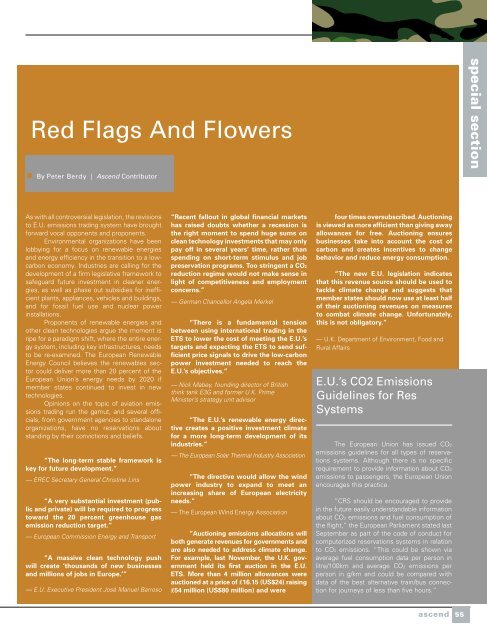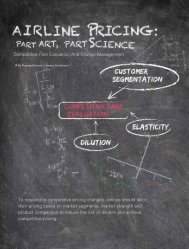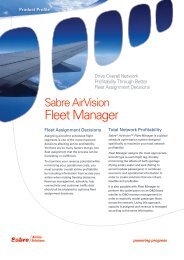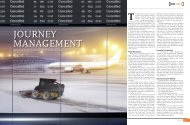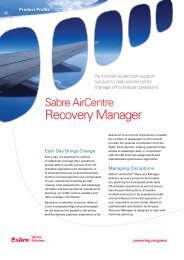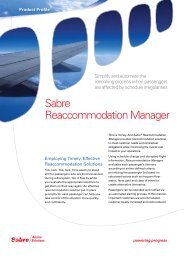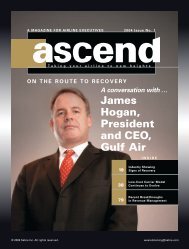2009 Issue 1 - Sabre Airline Solutions
2009 Issue 1 - Sabre Airline Solutions
2009 Issue 1 - Sabre Airline Solutions
Create successful ePaper yourself
Turn your PDF publications into a flip-book with our unique Google optimized e-Paper software.
Red Flags And Flowers<br />
By Peter Berdy | Ascend Contributor<br />
As with all controversial legislation, the revisions<br />
to E.U. emissions trading system have brought<br />
forward vocal opponents and proponents.<br />
Environmental organizations have been<br />
lobbying for a focus on renewable energies<br />
and energy efficiency in the transition to a lowcarbon<br />
economy. Industries are calling for the<br />
development of a firm legislative framework to<br />
safeguard future investment in cleaner energies,<br />
as well as phase out subsidies for inefficient<br />
plants, appliances, vehicles and buildings,<br />
and for fossil fuel use and nuclear power<br />
installations.<br />
Proponents of renewable energies and<br />
other clean technologies argue the moment is<br />
ripe for a paradigm shift, where the entire energy<br />
system, including key infrastructures, needs<br />
to be re-examined. The European Renewable<br />
Energy Council believes the renewables sector<br />
could deliver more than 20 percent of the<br />
European Union’s energy needs by 2020 if<br />
member states continued to invest in new<br />
technologies.<br />
Opinions on the topic of aviation emissions<br />
trading run the gamut, and several officials,<br />
from government agencies to standalone<br />
organizations, have no reservations about<br />
standing by their convictions and beliefs.<br />
“the long-term stable framework is<br />
key for future development.”<br />
— EREC Secretary General Christine Lins<br />
“A very substantial investment (public<br />
and private) will be required to progress<br />
toward the 20 percent greenhouse gas<br />
emission reduction target.”<br />
— European Commission Energy and Transport<br />
“A massive clean technology push<br />
will create ‘thousands of new businesses<br />
and millions of jobs in europe.’”<br />
— E.U. Executive President José Manuel Barroso<br />
“recent fallout in global financial markets<br />
has raised doubts whether a recession is<br />
the right moment to spend huge sums on<br />
clean technology investments that may only<br />
pay off in several years’ time, rather than<br />
spending on short-term stimulus and job<br />
preservation programs. too stringent a co2<br />
reduction regime would not make sense in<br />
light of competitiveness and employment<br />
concerns.”<br />
— German Chancellor Angela Merkel<br />
“there is a fundamental tension<br />
between using international trading in the<br />
ets to lower the cost of meeting the e.u.’s<br />
targets and expecting the ets to send sufficient<br />
price signals to drive the low-carbon<br />
power investment needed to reach the<br />
e.u.’s objectives.”<br />
— Nick Mabey, founding director of British<br />
think tank E3G and former U.K. Prime<br />
Minister’s strategy unit advisor<br />
“the e.u.’s renewable energy directive<br />
creates a positive investment climate<br />
for a more long-term development of its<br />
industries.”<br />
— The European Solar Thermal Industry Association<br />
“the directive would allow the wind<br />
power industry to expand to meet an<br />
increasing share of european electricity<br />
needs.”<br />
— The European Wind Energy Association<br />
“Auctioning emissions allocations will<br />
both generate revenues for governments and<br />
are also needed to address climate change.<br />
for example, last November, the u.K. government<br />
held its first auction in the e.u.<br />
ets. More than 4 million allowances were<br />
auctioned at a price of ₤16.15 (us$24) raising<br />
₤54 million (us$80 million) and were<br />
four times oversubscribed. Auctioning<br />
is viewed as more efficient than giving away<br />
allowances for free. Auctioning ensures<br />
businesses take into account the cost of<br />
carbon and creates incentives to change<br />
behavior and reduce energy consumption.<br />
“the new e.u. legislation indicates<br />
that this revenue source should be used to<br />
tackle climate change and suggests that<br />
member states should now use at least half<br />
of their auctioning revenues on measures<br />
to combat climate change. unfortunately,<br />
this is not obligatory.”<br />
— U.K. Department of Environment, Food and<br />
Rural Affairs<br />
E.U.’s CO2 Emissions<br />
Guidelines for Res<br />
Systems<br />
The European Union has issued CO2<br />
emissions guidelines for all types of reservations<br />
systems. Although there is no specific<br />
requirement to provide information about CO2<br />
emissions to passengers, the European Union<br />
encourages this practice.<br />
“CRS should be encouraged to provide<br />
in the future easily understandable information<br />
about CO2 emissions and fuel consumption of<br />
the flight,” the European Parliament stated last<br />
September as part of the code of conduct for<br />
computerized reservations systems in relation<br />
to CO2 emissions. “This could be shown via<br />
average fuel consumption data per person in<br />
litre/100km and average CO2 emissions per<br />
person in g/km and could be compared with<br />
data of the best alternative train/bus connection<br />
for journeys of less than five hours.”<br />
ascend 55<br />
special section


